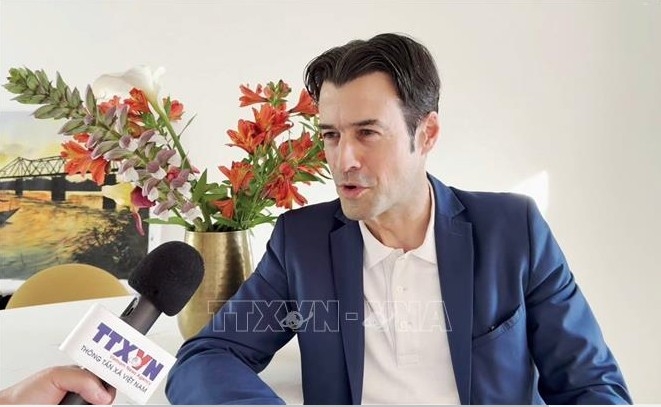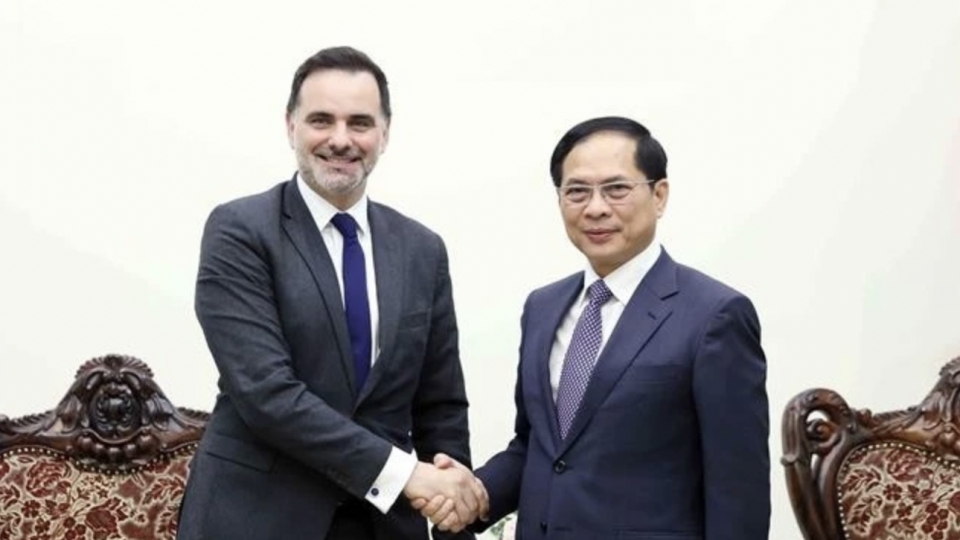French historian sees Vietnam-France ties as deep and full of promise
VOV.VN - Historian and professor Dr. Pierre Journoud has offered in-depth analysis of the current situation and future prospects of Vietnam-France relations, which were elevated to a Comprehensive Strategic Partnership in October 2024 ahead of the state visit to Vietnam by French President Emmanuel Macron and his spouse, slated for May 25-27.

This marks the fourth visit by a French President to Vietnam and comes at a time of far-reaching geopolitical shifts globally.
While it is still early to fully assess the outcomes of the newly upgraded partnership, Professor Journoud emphasized that this development represents a major step forward in building trust and establishing frameworks for dialogue and cooperation between the two countries.
He pointed out that a key catalyst for the signing of agreements was the increasing frequency of high-level visits, notably by French Minister of Armed Forces Sébastien Lecornu and Secretary of State Patricia Miralles on the occasion the 70th anniversary of the Dien Bien Phu Victory.
Professor Journoud underscored the growing influence of political ties in promoting new bilateral dialogue mechanisms, particularly in the maritime domain, an area where both France and Vietnam share clear strategic interests. He cited the establishment of the Foreign Ministry-level maritime dialogue as a visible example of the deepening strategic dimension of bilateral ties, further underscored by President Macron’s upcoming visit.
From a political and strategic standpoint, Journoud highlighted shared views between the two countries on major international issues, particularly the need to uphold international law, including the law of the sea, and the importance of defending multilateralism, which is increasingly under threat in today’s global landscape. Both nations, he noted, share a common outlook on global challenges and a commitment to preserving a rules-based international order.
On economics, the historian acknowledged the complementary nature of the two economies, stressing that this potential should be more fully tapped to strengthen bilateral trade.
In addition to political and economic factors, Journoud laid stress on the historical and cultural depth that has bound Vietnam and France together for decades. While acknowledging the presence of collective memories of conflict, he said that “those chapters have long been closed.” He cited multiple visits by French leaders to Dien Bien Phu as clear expressions of a desire to move beyond the past and focus on the future.
He also underlined the important role of the French-Vietnamese community, as saying that there are approximately 300,000 to 350,000 people of Vietnamese origin living in France, a large number. They serve as potential bridges propelling bilateral relations forward. Furthermore, he observed a growing interest among the French public in Vietnam. Despite disruptions caused by the COVID-19 pandemic, more and more French citizens are visiting Vietnam to discover the country.
The historian also pointed to expanding educational and academic exchanges. There has been a noticeable increase in student exchanges between the two countries. While the number of French students interested in studying in Vietnam was initially modest, it has been steadily growing.
Meanwhile, the number of Vietnamese students in France has reached around 5,000 to 6,000 as of 2024.
Despite many positive developments, Professor Journoud stated that both countries are still facing huge challenges, especially global issues such as environmental degradation, climate change, and rising sea levels. He also accentuated the importance of safeguarding international peace and expressed admiration for Vietnam’s proactive role in regional and global diplomacy, including its participation in some 30 UN peacekeeping missions since 2014.
In terms of bilateral ties, the most pressing challenge, he noted, lies in trade. He offered a sobering comparison by pointing out that around 40 years ago, France held about 5–6% of the Vietnamese market, whereas today, that figure has dropped to just 0.5%.
To overcome such barriers and step up cooperation, Journoud proposed several concrete measures. First, he stressed the need to improve awareness among French policymakers and businesses about Vietnam. He suggested establishing a network of intermediaries-individuals with deep understanding of both countries and experience in bilateral cooperation, who could provide guidance and support for businesses, legislators, and decision-makers seeking to deal with the Vietnamese market.
He also emphasized that successful cooperation with Vietnam requires genuine competitiveness, adding that France needs to promote its products and assert its strengths.
Regarding President Macron’s visit, the French historian described it as a particularly meaningful milestone in bilateral relations, following those of Presidents François Mitterrand (1993), Jacques Chirac (1997 and 2004), and François Hollande (2016).
He made a historical comparison by saying that if President Mitterrand’s 1993 visit symbolized the closing of a post-war chapter and the beginning of a new era, then President Macron’s visit now takes place in an entirely different geopolitical context, with Vietnam far removed from its wartime past.
Today, Vietnam demonstrates a strong commitment to international cooperation and plays an increasingly active role in multilateral diplomacy, from regional frameworks to global platforms such as the United Nations.
Journoud concluded that the visit holds great significance because both countries share clear agreement on key strategic priorities, particularly in defending international law and multilateralism, which are values currently under threat in today’s unstable world.
He also suggested that Vietnam-France ties could serve as a model for reconciliation, noting that the two nations were once adversaries and that Vietnam endured many conflicts thereafter. Yet the two sides managed to reconcile relatively quickly and have pursued a diplomatic approach rooted in peace, neutrality, and moderation in regional disputes.
Closing the discussion, Professor Journoud emphasized the uniqueness and depth of the bilateral relationship. He said we are fortunate to maintain a bilateral relationship that spans numerous fields, which is something not every country enjoys. He described President Macron’s visit as an opportunity to deepen existing ties and tackle unresolved challenges, especially in the area of trade.



